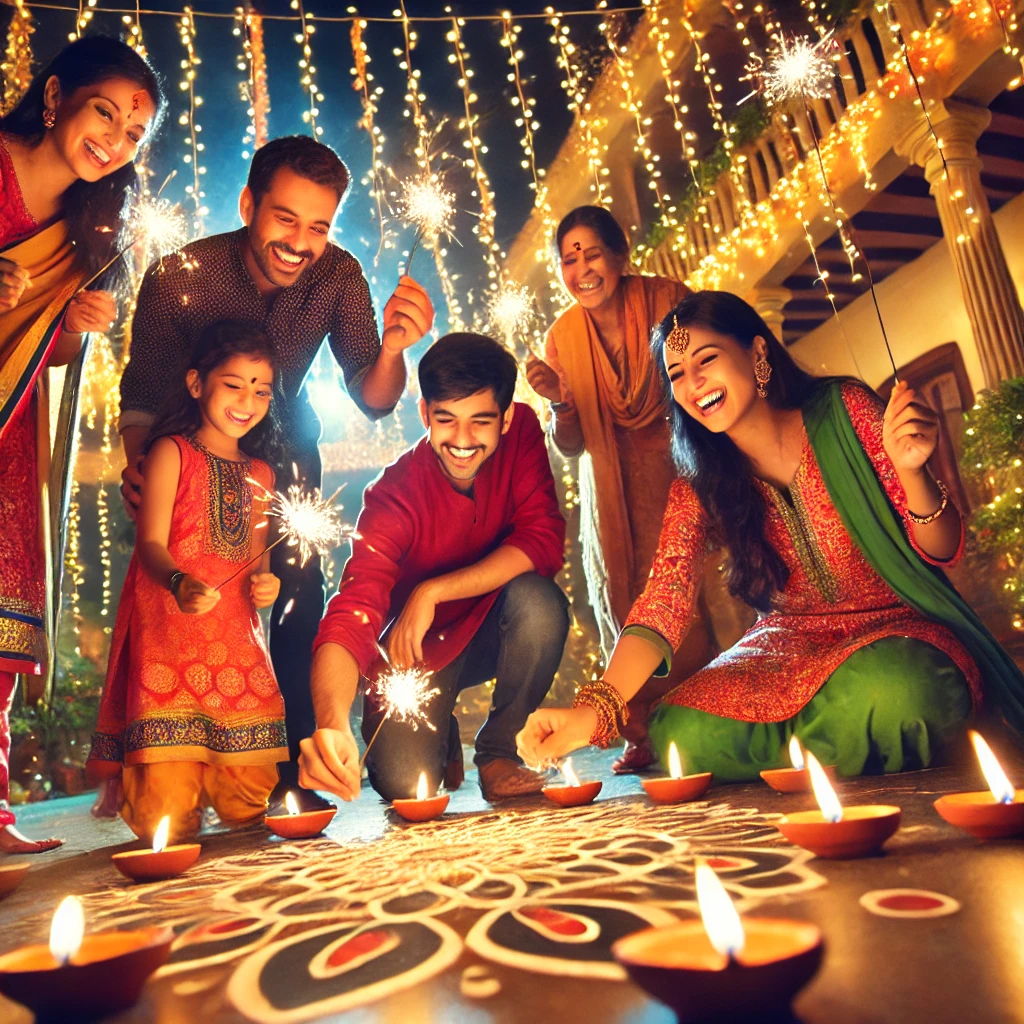Celebrating Diwali with family is a cherished tradition that combines rituals, joy, and togetherness. Every family has its own unique way of observing the festival, but there are several common practices that make the celebration truly special. Here’s a glimpse of how Diwali is typically celebrated with family:
1. Cleaning and Decorating the Home
- Preparation begins weeks before Diwali, with family members coming together to thoroughly clean and declutter the house. This tradition symbolizes the removal of negativity and prepares the home to welcome Goddess Lakshmi, the deity of wealth and prosperity.
- After cleaning, the family works together to decorate the house with diyas (oil lamps), candles, and fairy lights. Rangoli designs made from colorful powders or flower petals are created at the entrance of the home, adding a vibrant and festive touch.
2. Worship and Puja
- On Diwali day, the family gathers for Lakshmi Puja, the central religious ritual of the festival. The family sets up a special area with images or idols of Goddess Lakshmi and Lord Ganesha, decorated with flowers, fruits, sweets, and lit diyas.
- Together, the family performs the puja, offering prayers for prosperity, health, and happiness. They chant mantras, offer sweets (prasad), and distribute them to everyone after the ritual is completed.
3. Lighting Diyas and Bursting Crackers (Eco-Friendly Ways)
- As evening approaches, the family lights diyas (small clay oil lamps) and places them around the house, in courtyards, on balconies, and in windows. This is symbolic of dispelling darkness and ignorance while bringing in light and knowledge.
- Many families enjoy bursting firecrackers after the puja, although in recent years, there’s been a shift towards celebrating with eco-friendly crackers or opting for noise-free and pollution-free alternatives like sparklers or light displays to keep the celebration fun and safe.
4. Sharing Gifts and Sweets
- Exchanging gifts and sweets is an integral part of Diwali. Families prepare or buy traditional sweets like laddoos, barfi, and jalebi, sharing them with friends, neighbors, and extended family members.
- Parents often give gifts to children, and adults exchange thoughtful presents or tokens of appreciation. Diwali gifts can range from traditional items like clothing and jewelry to modern gadgets and decorative pieces.
5. Feasting Together
- Diwali is also a time for indulging in delicious food. Families come together to prepare a feast that includes a wide variety of festive dishes, snacks, and sweets. Favorites might include samosas, pakoras, kachori, and rich desserts like gulab jamun or rasgulla.
- Sharing a meal together is a beautiful way to bond and give thanks for the blessings of the past year while looking forward to new beginnings.
6. Quality Family Time
- Beyond rituals and celebrations, Diwali is a time for togetherness. Family members gather to enjoy each other’s company, tell stories, play traditional games like cards or dice, and reminisce about past celebrations.
- The evening is often spent with laughter and joy as the family comes together to celebrate this meaningful occasion.
7. Charity and Sharing Joy with Others
- Many families also believe in sharing their good fortune with those in need during Diwali. It’s common to donate food, clothes, or money to charitable causes or help those less fortunate.
- Acts of charity, such as giving to temples or providing meals for the needy, are seen as ways to bring blessings and enhance the spirit of Diwali.
Conclusion: Diwali as a Festival of Togetherness
Celebrating Diwali with family is a blend of rituals, warmth, and fun. From cleaning and decorating the home to performing religious rituals, sharing meals, and giving gifts, every part of the celebration reflects the importance of family and the joy of being together. More than anything, Diwali is about spreading love, light, and positivity—both within the family and in the larger community.
Each year, Diwali brings families closer and provides a beautiful reminder of the values of gratitude, togetherness, and generosity, making it one of the most anticipated and beloved festivals in Indian culture.

